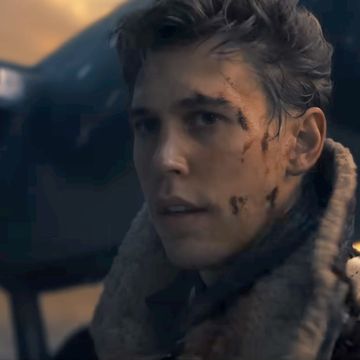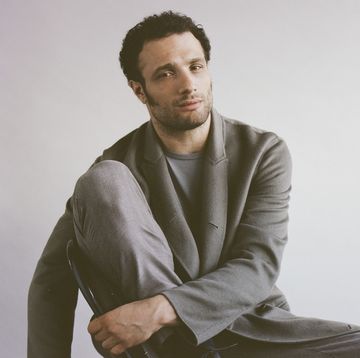Though Netflix's Mindhunter is yet to be officially renewed, the second season was unofficially a go long before the first ever came out—and it's clearly a show designed to run for several seasons. Beginning as it does in the 1970s with FBI agents Holden Ford (Jonathan Groff) and Bill Tench (Holt McCallany) interviewing serial killers, effectively creating what we now know as criminal psychology, the first season is only the tip of the iceberg as far as potentially fascinating subjects go. Think of Ted Bundy, Jeffrey Dahmer, and that long-teased Charles Manson interview.
Creator Joe Penhall and executive producer David Fincher reportedly have a five-season plan for the show, and there's one element so far that has made the long game particularly clear. That's the mysterious ADT employee in Kansas, who we glimpse in pre- and post-episode vignettes that have no connection to the show's main storyline. Though the show is yet to reveal his identity, it took eagle-eyed viewers very little time to figure out that he is probably Dennis Rader, better known as "the BTK killer"—that is bind, torture, kill. The BTK killer worked as an ADT serviceman in Kansas, and was active for almost two decades (from 1975 through 1991) and went uncaptured until 2005. The fact that Mindhunter has introduced him already, in the 1977-set first season, suggests we'll be following Ford and Tench into the 21st century.
Actor Sonny Valicenti is in an interesting spot when it comes to doing interviews because, officially, he is playing "ADT Serviceman" on Mindhunter. Still, he spoke to me about his approach to the role, what real serial killers he drew inspiration from, and why David Fincher's infamous multiple takes matter.
Valicenti was told almost nothing about the role until he got to set.
In the audition scene that I was sent, there was a bold line saying, "This is not your character speaking, this is a stock script that we're using for auditions." Once I got to set, I had a slightly better sense of how I would fit into the story, but I wouldn't get pages sometimes until the night before [shooting]. I just knew that I was going to be a looming presence that transitioned from everyday activities to, perhaps, hinting at something darker.
The character that I play, and the behavior that he exhibits, was kind of all that I was told. In terms of the really wonderful theories [online] about who this character is and the future of the show. I'm just as curious as you are to see how this pans out.
Though he won't confirm or deny that he's playing Dennis Rader, Valicenti did draw inspiration from footage of Rader along with several other real-life killers.
There are plenty of confession videos from serial killers on YouTube, and that was a big part of my process of preparing. Dennis Rader's an example, Ed Kemper's an example, Charles Manson in his own way—the way they speak about this behavior and how it affects their body, and how it sort of channels through them. There are certain moments where the judge in the court will ask them to specify their intention, what drove them to do it, and they will have a very specific physical and vocal reaction. So studying confession tapes was a big wealth of information for me, in terms of how this character's gonna carry himself, and when that urge and desire takes over, and what the difference is between feeling like a normal human being and then having this... what some have called a demon inside of them, and what that looks like when it takes over.
Fincher directed Valicenti to keep his performance as simple as possible.
In just about every scene I did, Mr Fincher would say "No, you're not psycho killer, you're not playing psycho killer." He just stressed the simplicity of it: There doesn't need to be any weird facial tics, or weird intonations that let everybody know this is a psycho killer. In fact, the most effective way to show the behavior of this character is to just allow it to be very human and very simple, which is kind of the thesis of the show—to get out of that black-and-white way of looking at this behavior and really try and understand it from a human point of view.
Despite being entirely in his own story thread, Valicenti did interact with the rest of the cast.
I would go to set on my days off, and I had a moment to sit down with Jonathan Groff—gosh, I actually don't think I can name a sweeter person! He made me feel so welcome, and the same with Holt McCallany, who's just a real friend immediately. It was funny because they didn't really have any idea what was going on with my character either, so it was all just this wide-eyed mystery we were all wading through.
In trying to identify with the mindset of a serial killer, Valicenti honed in on ideas of compulsion and shame.
One of the first things I started to think about when working on the role, which made me lean in a little bit further, was: "What in my life do I have an insatiable desire for?" Something that drives me towards it, and yet at the same time has great shame surrounding it. Whether it's like, eating a whole pizza in a day—that's a lame example, but I had to find what about that is similar to me. It's a potent cocktail, that desire and shame mixed together, and once I landed on that, my fascination with the subject grew immensely.
Fincher's infamous multiple takes really are there for a reason.
Doing 50 or 60 takes really starts to cultivate a sense of, "I don't know any more." Everything that I would prepare was stripped away within the first ten takes, and then we were in a realm of possibility, and I think that's where the work really begins with Fincher, and it's frightening. There is a lot of "I have no idea what I'm doing," but with all the moment-to-moment craftsmanship that he brings to the project, you never feel unsafe and you never feel unsure, even though you definitely don't know what's going to come out. I think that's where the art happens for him.














